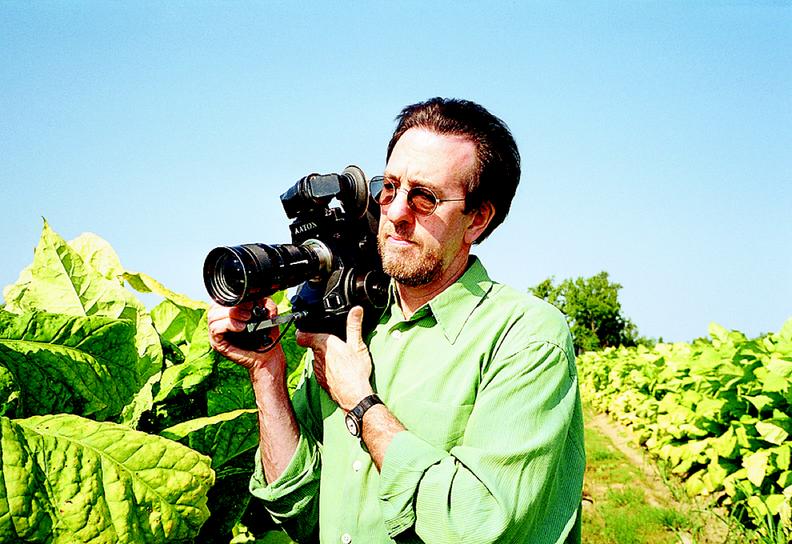Now, McElwee has burst out of the halls of academia (he's a professor at Harvard) with another sneaky self-examination that accomplishes almost the complete opposite of Sherman's March–it starts out as a deeply personal documentary and finds a rather global story buried in there somewhere.
The film begins as McElwee goes back home to North Carolina to meet with a distant cousin. This cousin, it happens, is a collector of movie memorabilia. His house is overflowing with posters and movie photos. Even more impressive is his collection of original 16mm films. The prize of his collection turns out to be a rather obscure 1950 melodrama called Bright Leaf starring Gary Cooper, Lauren Bacall and Patricia Neal. McElwee's cousin is convinced that the film is a thinly disguised portrait of their great grandfather, H.J. McElwee, a pioneer in the tobacco industry who was driven out of business by his rival Washington Duke. According to family legend, Duke stole McElwee's formula for Durham “Bull” tobacco and burned down several of his warehouses. Duke went on to become the king of southern tobacco and even founded Duke University. H.J. McElwee died in relative poverty.
At first, this surprise revelation inspires a bit of jealousy on the filmmaker's part. If history (and several court cases) had been a little kinder to his great grandfather, Ross McElwee would right now be sitting on top of one of the biggest fortunes in America. As his obsession with Bright Leaf and its connection to his family history settles in, however, McElwee begins to think of the bigger picture. Sure, he'd be rich, but he'd be part and parcel to the tobacco industry.
Naturally, McElwee uses his camera to document a personal and public journey through the world of tobacciana. He interviews local historians, trying to nail down his great grandfather's place in history. He chronicles the amusingly pathetic efforts of two friends who want to quit smoking. He speaks to cancer patients in the hospital. He interviews his brother, a doctor who has–ironically–made a comfortable living treating local cancer victims. He talks to a rabid film historian about the cinematic merits of Bright Leaf. He even stumbles across actress Patricia Neal at a film festival and interviews her about her role in the film.
Like Morgan Spurlock's Super Size Me from earlier this year, Bright Leaves brings up a lot of salient cultural points asking exactly why Americans are so hell-bent on destroying their own health. McElwee's dry sense of humor keeps the film buoyant and stops the narrative from becoming didactic or depressing. McElwee's “narrator in search of a narrative” style makes everything seem inventive and unexpected. Still, some viewers may find his meandering style a bit scattershot. Like Nathaniel Khan's My Architect, this is a deeply personal documentary. Whatever crosses the path of the filmmaker during the course of shooting this film–from McElwee's attempts to bond with his teenage son to home movies of his physician father–are thrown in. In a way, they all blend together to form a single point. But certain segments do seem more tangential than others.
As an examination of the dangers of tobacco use in America and of the corporate culture that keeps it alive, Bright Leaf is a mere surface scratch. As an introspective essay on how the tobacco industry is so deeply intertwined with one man's family history, however, Bright Leaf is an amazing, insightful film–the latest essential chapter in McElwee's long-running autobiography.



